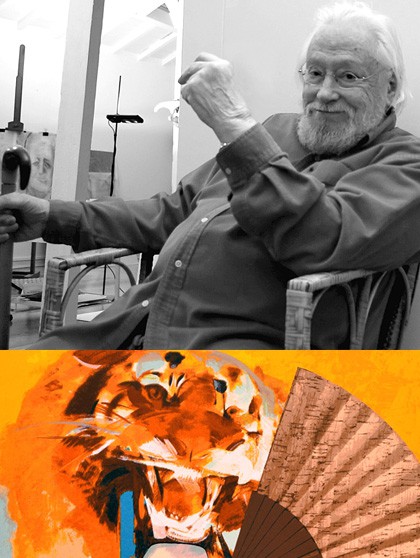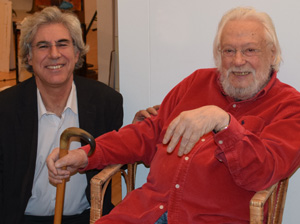
Júlio Pomar
"it is always rewarding for an artist to see that his work is longed for"
On the occasion of the making of the screen print Um Ar que lhe deu, a special edition by Júlio Pomar included in the 30 years of CPS, João Prates, CPS director, talked with the artist, deacon of the great masters of the Portuguese 20th century, at his Lisbon studio.
Júlio Pomar, you were in the origin of the creation of the Cooperative of Portuguese Engravers, in 1956, which was an embryo for contemporary Graphic Work and, since then, you have developed a remarkable course in this area, exploring all techniques. Do you have any favourite technique that has given you a greater creative pleasure?
It is hard to say. At the time, as I was experimenting, I fell in love with that kind of engraving. Later, when I started living in Paris, what happened in graphic terms was mostly colourful lithographs and screen prints. We know those words better than the actual technical things of engraving, since this trend towards colours has grown side by side with the technological development.
The relevance of your Graphic Work is reinforced by the raisonné catalogue, in preparation and due to be out soon. What has been the importance of the graphic works and the multiple in your artistic path?
The graphic work has been very important to me, in its different modes, and constitutes a fundamental part of my work.
Due to the admiration we have for your work, it is a privilege for CPS to be able to rely on your collaboration in its 30th year with a special screen print that synthesizes three of your favourite processes, painting, drawing and the objet trouvé. Can you tell us about this work in particular?
Compared with most of my recent work, this work is different due to the fact that it has been entirely created and it is not in any way a kind of reproduction. Using pre‑existing elements, it is not a recreation of anything already made, it is the meeting of elements on the sheet of paper, which come from different directions and this meeting does not exist except in the work itself.
Young people are those to whom Graphic Work makes more sense. What would you like to convey to the young collectors and admirers of your work?
Well, it is always rewarding for an artist to see that his work is longed for, that it arouses curiosity and interest, especially after dwelling for many years in what I’d like to call the Stations of the Cross.
In a voracious and fast world, in constant mutation and without space for reflection and contemplation, is Art always urgent?
I think it is always urgent. It does not exist without reflection, without questioning things.
Let’s say that art is forever young. In a way, it always has to comprise the future.
Naturally, otherwise it is no longer art.

I came across Júlio Pomar’s studio in the nineties in the context of an article for the magazine ‘Galeria de Arte’, edited by CPS. I immediately grasped it as a place of worship, where you should keep your voice low, a laboratory of incantation and creation. I recently went back there, on the occasion of the screen print edition for the 30 years of CPS, and I had this brief but unforgettable dialogue with one of the most important Portuguese artists from the second half of the 20th century. I’m glad I can share it. João Prates